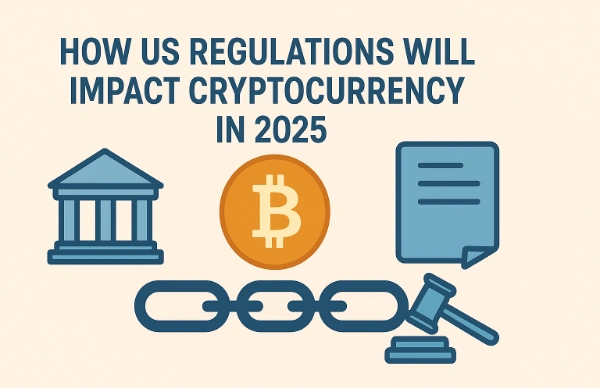The cryptocurrency landscape in the United States is experiencing unprecedented regulatory changes in 2025. As federal agencies implement new frameworks and Congress passes comprehensive legislation, the impact on digital asset markets is profound. Understanding these regulatory shifts is crucial for anyone investing in cryptocurrency markets today.
Table of Contents
Current Regulatory Landscape
The US regulatory environment for cryptocurrencies has evolved significantly since Bitcoin’s inception. Multiple federal agencies now oversee different aspects of digital assets, creating a complex web of compliance requirements that directly affects anyone investing in cryptocurrency.
Primary Regulatory Bodies
Securities and Exchange Commission (SEC) continues to be the dominant force in cryptocurrency regulation. Under current leadership, the SEC has clarified its position on various digital assets, determining which tokens qualify as securities and which do not. This classification system significantly impacts how investors can access and trade different cryptocurrencies.”How US Regulations Will Impact Cryptocurrency”
Commodity Futures Trading Commission (CFTC) maintains jurisdiction over Bitcoin and Ethereum, treating them as commodities rather than securities. This distinction has created clearer pathways for investing in these major cryptocurrencies through traditional financial institutions.
Financial Crimes Enforcement Network (FinCEN) focuses on anti-money laundering (AML) and know-your-customer (KYC) requirements. These regulations have strengthened the compliance framework for cryptocurrency exchanges and wallet providers.
Federal Reserve has increased its oversight role, particularly regarding stablecoins and central bank digital currencies (CBDCs). Their policies directly influence market liquidity and institutional adoption rates. How US Regulations Will Impact Cryptocurrency
Also read: How Blockchain Is Disrupting the American Banking System
Regulatory Framework Evolution
The regulatory framework has shifted from a fragmented approach to a more coordinated strategy. This evolution affects every aspect of investing in digital assets, from initial coin offerings (ICOs) to decentralized finance (DeFi) protocols.
| Regulatory Aspect | 2023 Status | 2025 Status | Impact Level |
|---|---|---|---|
| Exchange Licensing | Varied by state | Federal framework established | High |
| Stablecoin Oversight | Limited | Comprehensive regulation | Very High |
| DeFi Regulation | Unclear | Defined guidelines | Medium |
| Institutional Custody | Basic rules | Enhanced requirements | High |
| Tax Reporting | Manual reporting | Automated systems | Very High |
Key Regulatory Changes in 2025
Stablecoin Regulation Act
The most significant development affecting investing in cryptocurrency markets is the comprehensive stablecoin legislation passed in early 2025. This act requires all stablecoin issuers to maintain full reserves and undergo regular audits.
Key provisions include:
- Reserve Requirements: Stablecoin issuers must back every token with equivalent fiat currency or Treasury securities
- Banking Partnerships: Only FDIC-insured banks can hold stablecoin reserves
- Regular Auditing: Monthly attestations and annual comprehensive audits
- Consumer Protection: Enhanced disclosure requirements and redemption guarantees
These changes have stabilized the stablecoin market, making it more attractive for institutional investors while providing greater security for retail investors investing in cryptocurrency ecosystems.
Digital Asset Market Structure Act
This comprehensive legislation has established clear rules for cryptocurrency exchanges and trading platforms. The act creates a unified regulatory framework that eliminates much of the previous uncertainty around investing in digital assets.How US Regulations Will Impact Cryptocurrency
Major components:
- Exchange Registration: All cryptocurrency exchanges must register with federal regulators
- Market Making Rules: Clear guidelines for authorized market makers and liquidity providers
- Custody Standards: Enhanced security requirements for digital asset custodians
- Investor Protection: Segregation of customer funds and insurance requirements
Enhanced KYC/AML Requirements
New anti-money laundering regulations have strengthened verification processes across all cryptocurrency platforms. While this increases compliance costs, it also legitimizes the space for mainstream investing in cryptocurrency markets.
Implementation timeline:
- Q1 2025: Enhanced identity verification for all new accounts
- Q2 2025: Retroactive verification for existing accounts above $10,000
- Q3 2025: Real-time transaction monitoring implementation
- Q4 2025: Full integration with traditional banking AML systems
Also read: Top U.S. Blockchain Companies to Watch in 2025
Impact on Different Cryptocurrency Types
Bitcoin and Ethereum
As established commodities under CFTC jurisdiction, Bitcoin and Ethereum benefit from regulatory clarity. This classification has opened new avenues for investing in cryptocurrency through traditional financial products.How US Regulations Will Impact Cryptocurrency

Positive developments:
- ETF Approvals: Multiple Bitcoin and Ethereum ETFs now trade on major exchanges
- Institutional Products: Banks can now offer cryptocurrency custody and trading services
- Futures Markets: Enhanced derivatives trading with better price discovery mechanisms
- Integration: Seamless integration with traditional portfolio management systems
Altcoins and Emerging Tokens
Smaller cryptocurrencies face more stringent regulatory scrutiny. The SEC’s updated Howey Test application has created clear categories for different token types, affecting investment strategies significantly.
Classification impacts:
- Utility Tokens: Tokens with clear utility functions face lighter regulation
- Security Tokens: Heavy compliance requirements but clearer legal status
- Governance Tokens: New category with specific voting rights protections
- Meme Coins: Increased scrutiny and potential delisting from major exchanges
Stablecoins
The new regulatory framework has transformed the stablecoin landscape. Investing in cryptocurrency often involves stablecoins as intermediate holdings, making these regulations particularly important.
Market changes:
- Consolidation: Smaller stablecoin projects have exited the market
- Yield Opportunities: Regulated stablecoins now offer transparent yield products
- Cross-border Efficiency: Enhanced international transfer capabilities
- DeFi Integration: Clearer rules for stablecoin use in decentralized protocols
Also read: Top 10 ASX Shares That Outperformed the Australian Market in 2025
Exchange and Trading Platform Regulations
Centralized Exchange Requirements
Cryptocurrency exchanges now operate under comprehensive federal oversight. These regulations have significantly improved the security and reliability of platforms used for investing in cryptocurrency.
Core requirements:
- Capital Requirements: Minimum capital reserves based on trading volume
- Segregation Rules: Customer funds must be held separately from operational funds
- Insurance Coverage: Mandatory coverage for hot wallet holdings and operational risks
- Reporting Standards: Regular financial and operational reports to regulators
Decentralized Exchange (DEX) Oversight
Regulators have developed nuanced approaches to decentralized trading platforms. While maintaining the decentralized ethos, new rules ensure investor protection without stifling innovation.
Regulatory approach:
- Protocol Governance: Requirements for transparent governance mechanisms
- Front-end Compliance: User interfaces must implement basic KYC for large transactions
- Liquidity Provider Rules: Guidelines for institutional liquidity provision
- Cross-chain Compliance: Enhanced oversight for multi-blockchain protocols
Trading Platform Innovation
The regulatory clarity has spurred innovation in trading platform features. New tools make investing in cryptocurrency more accessible and secure for both retail and institutional investors.
Recent innovations:
- Automated Compliance: Real-time regulatory compliance checking
- Advanced Analytics: Institutional-grade market analysis tools
- Risk Management: Sophisticated portfolio risk assessment features
- Educational Integration: Built-in investor education and certification programs
Tax Implications for Crypto Investors

Updated Tax Framework
The Internal Revenue Service has implemented comprehensive cryptocurrency tax guidelines for 2025. These changes significantly impact the after-tax returns of investing in cryptocurrency.
Key tax changes:
- Simplified Reporting: Automated tax reporting through exchange partnerships
- Capital Gains Clarity: Clear guidance on holding periods and tax rates
- Staking Rewards: Defined treatment of proof-of-stake rewards and airdrops
- DeFi Activities: Specific rules for yield farming and liquidity provision
Compliance Tools and Resources
New technological solutions have emerged to help investors manage their cryptocurrency tax obligations effectively.
Available tools:
- Automated Tracking: Integration between exchanges and tax software
- Real-time Calculations: Live tax liability calculations during trading
- Professional Services: Expanded CPA services specializing in crypto taxation
- Educational Programs: IRS-approved courses on cryptocurrency tax compliance
Institutional vs. Retail Impact
Institutional Investment Changes
Regulatory clarity has accelerated institutional adoption of cryptocurrency investments. Major financial institutions now offer comprehensive digital asset services.How US Regulations Will Impact Cryptocurrency
Institutional developments:
- Bank Custody: National banks can now provide cryptocurrency custody services
- Investment Products: Expanded range of crypto investment vehicles for institutions
- Risk Management: Enhanced tools for institutional risk assessment and compliance
- Integration Services: Seamless integration with existing institutional infrastructure
Retail Investor Protections
New regulations have strengthened protections for individual investors while maintaining market accessibility.
Consumer safeguards:
- Enhanced Disclosure: Clear risk warnings and product information requirements
- Fraud Prevention: Stronger enforcement against cryptocurrency scams
- Insurance Options: New insurance products for retail cryptocurrency holdings
- Educational Requirements: Mandatory investor education for high-risk products
Market Access Improvements
Regulatory frameworks have improved market access for all investor types, making investing in cryptocurrency more straightforward and secure.
Also read: How to Analyze a Company Financials Before Buying Stocks in the USA
State-Level Regulatory Variations
Leading Cryptocurrency-Friendly States
Several states have emerged as cryptocurrency innovation hubs through progressive regulatory frameworks that encourage investing in digital assets.
Top crypto-friendly states:
Wyoming continues leading with comprehensive digital asset legislation, including:
- Special purpose depository institutions (SPDIs) for cryptocurrency custody
- Clear property rights for digital assets
- Favorable tax treatment for cryptocurrency businesses
- Streamlined licensing for blockchain companies
Texas has established itself as a major cryptocurrency mining and trading hub:
- Competitive energy markets for cryptocurrency mining operations
- Business-friendly regulatory environment for crypto companies
- Major exchange partnerships with state-chartered banks
- Educational initiatives promoting cryptocurrency literacy
Florida has attracted significant cryptocurrency investment through:
- No state income tax benefiting cryptocurrency gains
- Government acceptance of cryptocurrency for certain payments
- Major cryptocurrency conferences and industry events
- University blockchain research programs
States with Restrictive Approaches
Some states maintain cautious approaches to cryptocurrency regulation, affecting regional investing in cryptocurrency markets.How US Regulations Will Impact Cryptocurrency
Regulatory variations by state:
- New York: Maintains the BitLicense system with stringent requirements
- California: Enhanced consumer protection measures with complex compliance
- Hawaii: Restrictive policies affecting exchange operations and services
- Connecticut: Moderate approach with enhanced investor protection measures
Global Regulatory Coordination
International Cooperation Framework
US regulations increasingly coordinate with international standards, affecting global investing in cryptocurrency markets and cross-border transactions.
Key international initiatives:
- Financial Action Task Force (FATF): Enhanced global AML standards for cryptocurrencies
- G20 Coordination: Unified approach to stablecoin regulation among major economies
- Basel Committee: International banking standards for cryptocurrency exposure
- International Organization of Securities Commissions (IOSCO): Global securities regulation coordination
Cross-Border Transaction Rules
New rules governing international cryptocurrency transactions have implications for US-based investors engaging in global markets.
Impact areas:
- Reporting Requirements: Enhanced disclosure for international cryptocurrency transfers
- Tax Treaties: Updated agreements addressing cryptocurrency taxation across borders
- Exchange Partnerships: Regulated pathways for international exchange cooperation
- Sanctions Compliance: Strengthened enforcement of international sanctions through blockchain analysis
Future Outlook and Predictions
Regulatory Trends to Watch
Several emerging trends will shape the future of investing in cryptocurrency under US regulations.
Anticipated developments:
- Central Bank Digital Currency (CBDC): Federal Reserve digital dollar development and implementation
- Environmental Regulations: Potential sustainability requirements for cryptocurrency mining operations
- Privacy Coin Oversight: Enhanced scrutiny of privacy-focused cryptocurrencies
- Artificial Intelligence Integration: Regulations addressing AI-powered trading and investment platforms
Market Evolution Predictions
The regulatory environment will continue evolving, creating new opportunities and challenges for cryptocurrency investors.
Expected market changes:
- Increased Institutional Adoption: More traditional financial institutions entering cryptocurrency markets
- Product Innovation: New investment products combining traditional assets with cryptocurrencies
- Market Maturation: Reduced volatility as markets mature under regulatory oversight
- Technology Integration: Enhanced integration between traditional finance and cryptocurrency systems
Long-term Implications
The current regulatory trajectory suggests a future where investing in cryptocurrency becomes as mainstream as investing in traditional securities, with appropriate safeguards and oversight.
Practical Investment Strategies
Compliance-First Approach
Modern cryptocurrency investment strategies must prioritize regulatory compliance while maximizing returns.
Essential compliance considerations:
- Platform Selection: Choose regulated exchanges with strong compliance records
- Documentation: Maintain detailed records of all cryptocurrency transactions
- Professional Advice: Work with qualified financial advisors familiar with cryptocurrency regulations
- Regular Updates: Stay informed about changing regulatory requirements and compliance obligations
Diversification Strategies
Regulatory clarity enables more sophisticated portfolio construction approaches for investing in cryptocurrency assets.
Recommended diversification methods:
- Asset Class Mixing: Combine different types of cryptocurrencies with varying regulatory treatments
- Geographic Diversification: Include international exposure through compliant global platforms
- Product Diversification: Mix direct holdings with regulated investment products like ETFs
- Risk Layering: Balance high-risk emerging tokens with established, regulated cryptocurrencies
Risk Management Frameworks
New regulatory requirements have created better tools for managing investment risks in cryptocurrency markets.
Risk management tools:
- Regulatory Risk Assessment: Evaluate potential regulatory changes affecting specific investments
- Compliance Monitoring: Automated tools for tracking regulatory compliance across portfolios
- Stress Testing: Scenario analysis for different regulatory outcomes
- Professional Management: Access to regulated investment advisory services
Investment Product Options
The regulatory environment has expanded the range of products available for investing in cryptocurrency markets.
Available investment vehicles:
- Spot ETFs: Direct exposure to Bitcoin and Ethereum through traditional brokerage accounts
- Futures-Based Products: Regulated derivatives providing leveraged exposure
- Structured Products: Complex instruments combining cryptocurrencies with traditional assets
- Managed Funds: Professional management through registered investment advisors
Technology and Infrastructure Impact
Blockchain Infrastructure Development

Regulatory clarity has accelerated infrastructure development, improving the foundation for investing in cryptocurrency markets.
Infrastructure improvements:
- Custody Solutions: Bank-grade custody services for institutional and retail investors
- Trading Infrastructure: Enhanced trading platforms with regulatory-compliant features
- Payment Systems: Integration with traditional payment networks and banking systems
- Analytics Platforms: Professional-grade analysis tools for investment decision-making
Security Enhancements
Regulatory requirements have driven significant improvements in cryptocurrency security standards.
Security developments:
- Multi-signature Requirements: Enhanced security protocols for large transactions
- Insurance Standards: Comprehensive coverage requirements for platform operators
- Audit Requirements: Regular security audits and penetration testing mandates
- Recovery Mechanisms: Improved processes for recovering lost or stolen cryptocurrencies
Market Liquidity and Efficiency
Improved Market Structure
Regulatory frameworks have enhanced market efficiency, benefiting all participants investing in cryptocurrency markets.
Market improvements:
- Price Discovery: Better price discovery mechanisms through regulated market makers
- Reduced Spreads: Tighter bid-ask spreads due to increased institutional participation
- Market Depth: Deeper order books providing better execution for large trades
- Transparency: Enhanced market data and reporting requirements improving market transparency
Institutional Participation
The regulatory environment has facilitated unprecedented institutional participation in cryptocurrency markets.
Institutional developments:
- Bank Participation: Major banks now offer cryptocurrency services to clients
- Asset Manager Entry: Traditional asset managers launching cryptocurrency products
- Insurance Company Investment: Insurance companies allocating to digital assets
- Pension Fund Consideration: Public pension funds evaluating cryptocurrency allocations
Challenges and Opportunities
Ongoing Challenges
Despite regulatory progress, certain challenges persist for those investing in cryptocurrency markets.
Current challenges:
- Regulatory Complexity: Navigating multiple overlapping regulatory frameworks
- Technology Risks: Managing technological risks in rapidly evolving systems
- Market Volatility: Continued price volatility despite increased regulation
- Scalability Issues: Blockchain scalability challenges affecting transaction costs and speeds
Emerging Opportunities
Regulatory clarity has created new opportunities for sophisticated cryptocurrency investment strategies.
New opportunities:
- Yield Generation: Regulated staking and lending opportunities with institutional counterparties
- Cross-Asset Strategies: Integration opportunities with traditional investment portfolios
- Innovation Investment: Venture capital opportunities in compliant blockchain startups
- Infrastructure Investment: Opportunities in regulated cryptocurrency infrastructure companies
Practical Guidance for Investors
Due Diligence Framework
Effective due diligence has become more important than ever when investing in cryptocurrency under the new regulatory environment.
Due diligence checklist:
- Platform Verification: Confirm exchange registration and compliance status
- Asset Classification: Understand the regulatory classification of target investments
- Tax Planning: Develop strategies for managing cryptocurrency tax obligations
- Risk Assessment: Evaluate both investment and regulatory risks comprehensively
Portfolio Construction
Modern portfolio theory applies to cryptocurrency investments, enhanced by regulatory clarity and improved market structure.
Portfolio considerations:
- Allocation Strategies: Determine appropriate cryptocurrency allocation within overall portfolio
- Rebalancing Methods: Regular rebalancing strategies accounting for tax implications
- Risk Management: Implement stop-losses and position sizing appropriate for risk tolerance
- Performance Monitoring: Track performance against relevant benchmarks and regulatory changes
Investment Protection Measures
Fraud Prevention
Enhanced regulatory oversight has significantly reduced fraud risks in cryptocurrency markets, protecting investors through multiple mechanisms.
Protection measures:
- Exchange Vetting: Rigorous vetting processes for cryptocurrency exchange operators
- Project Screening: Enhanced due diligence requirements for new token listings
- Investor Education: Mandatory education programs for high-risk investment products
- Enforcement Actions: Swift enforcement against fraudulent schemes and bad actors
Insurance and Recovery
New insurance products and recovery mechanisms provide additional protection for cryptocurrency investors.
Protection options:
- Exchange Insurance: FDIC-style insurance for qualified cryptocurrency exchanges
- Private Insurance: Third-party insurance products for individual cryptocurrency holdings
- Recovery Services: Professional services for recovering lost or stolen cryptocurrencies
- Legal Protections: Enhanced legal recourse for fraud victims and failed platforms
Future Regulatory Developments
Anticipated Changes
The regulatory landscape will continue evolving throughout 2025 and beyond, creating ongoing implications for investing in cryptocurrency markets.
Expected developments:
- CBDC Implementation: Federal Reserve digital currency rollout affecting private cryptocurrencies
- Environmental Regulations: Potential sustainability requirements for cryptocurrency operations
- International Coordination: Enhanced coordination with international regulatory bodies
- Technology Standards: Development of technical standards for blockchain interoperability
Preparing for Changes
Successful cryptocurrency investors must stay ahead of regulatory developments and adapt their strategies accordingly.
Preparation strategies:
- Regulatory Monitoring: Establish systems for tracking regulatory developments and their implications
- Professional Networks: Build relationships with qualified cryptocurrency investment professionals
- Education Investment: Continuous education about regulatory changes and their market impacts
- Strategy Flexibility: Maintain flexible investment strategies adaptable to regulatory changes
Risk Assessment and Mitigation
Regulatory Risk Factors
Understanding and managing regulatory risk is essential for successful investing in cryptocurrency markets.
Primary risk factors:
- Policy Changes: Potential for sudden regulatory shifts affecting investment values
- Enforcement Actions: Risk of enforcement actions against platforms or specific cryptocurrencies
- International Coordination: Changes in international regulatory coordination affecting global markets
- Technology Regulation: Potential technology-specific regulations affecting different blockchain platforms
Mitigation Strategies
Effective risk mitigation strategies help protect cryptocurrency investments from regulatory uncertainty.
Risk mitigation approaches:
- Diversification: Spread investments across different regulatory categories and jurisdictions
- Professional Management: Utilize professional investment managers with regulatory expertise
- Conservative Positioning: Maintain conservative position sizes in high-risk regulatory environments
- Exit Planning: Develop clear exit strategies for different regulatory scenarios
Frequently Asked Questions
How do new US regulations affect international cryptocurrency exchanges?
International exchanges serving US customers must comply with US regulations or restrict access to US investors. This has led many platforms to implement geo-blocking or establish US-specific entities with full regulatory compliance.
Can I still invest in cryptocurrency anonymously in 2025?
No, enhanced KYC requirements make anonymous investing in cryptocurrency practically impossible on regulated platforms. All legitimate exchanges require identity verification for compliance with federal anti-money laundering laws.
What happens to my existing cryptocurrency holdings under new regulations?
Existing holdings remain yours, but you may need to complete additional verification processes with your exchange or wallet provider. Some tokens may face delisting from certain platforms if they don’t meet new compliance requirements.
Are cryptocurrency gains still taxable in 2025?
Yes, cryptocurrency gains remain subject to capital gains taxation. However, new reporting requirements have simplified tax compliance through automated reporting systems integrated with major exchanges.
Is investing in cryptocurrency safer now with increased regulation?
Regulation has reduced certain risks like exchange fraud and market manipulation, but cryptocurrency investments still carry significant price volatility and technology risks. Regulatory compliance doesn’t eliminate investment risk.
Conclusion
The regulatory landscape for investing in cryptocurrency has matured significantly in 2025, creating a more stable and predictable environment for both institutional and retail investors. While challenges remain, the enhanced regulatory framework provides clearer guidelines, better investor protections, and improved market infrastructure.
The key to successful cryptocurrency investment in this new regulatory environment lies in understanding compliance requirements, choosing regulated platforms and products, maintaining proper documentation, and staying informed about ongoing regulatory developments. As the market continues maturing under regulatory oversight, opportunities for sophisticated investment strategies will continue expanding.
For investors considering entering or expanding their cryptocurrency holdings, 2025 represents an opportune time to engage with digital assets through properly regulated channels. The combination of regulatory clarity, improved infrastructure, and enhanced investor protections creates a more accessible and secure environment for participating in the cryptocurrency revolution.
Whether you’re a seasoned investor or new to digital assets, understanding these regulatory impacts is essential for making informed investment decisions in the evolving cryptocurrency landscape. As regulations continue refining throughout 2025, staying educated and working with qualified professionals will remain crucial for investment success in this dynamic market.
Disclaimer: The information provided on CryptoStockHub.com is for educational and informational purposes only and should not be considered financial, investment, or trading advice. We are not financial advisors. Investing in stocks, ASX shares, blockchain, or cryptocurrencies is a high-risk endeavor, and it is essential to conduct your own research or consult a licensed financial advisor before making any investment decisions. Past performance is not an indication of future results.






